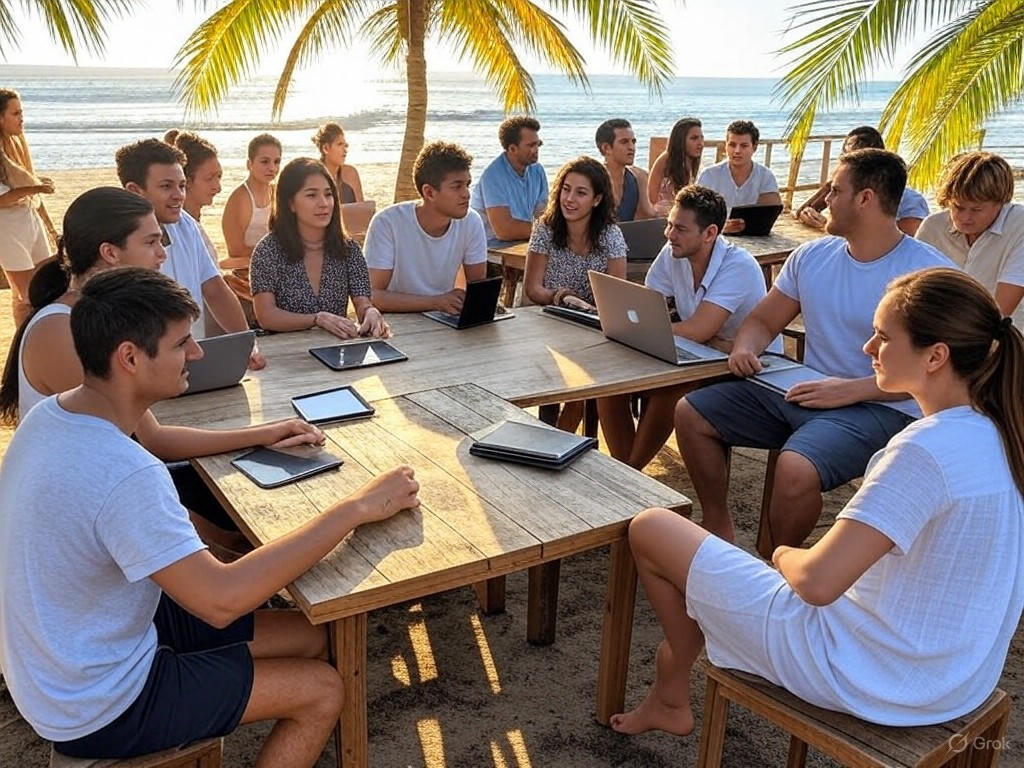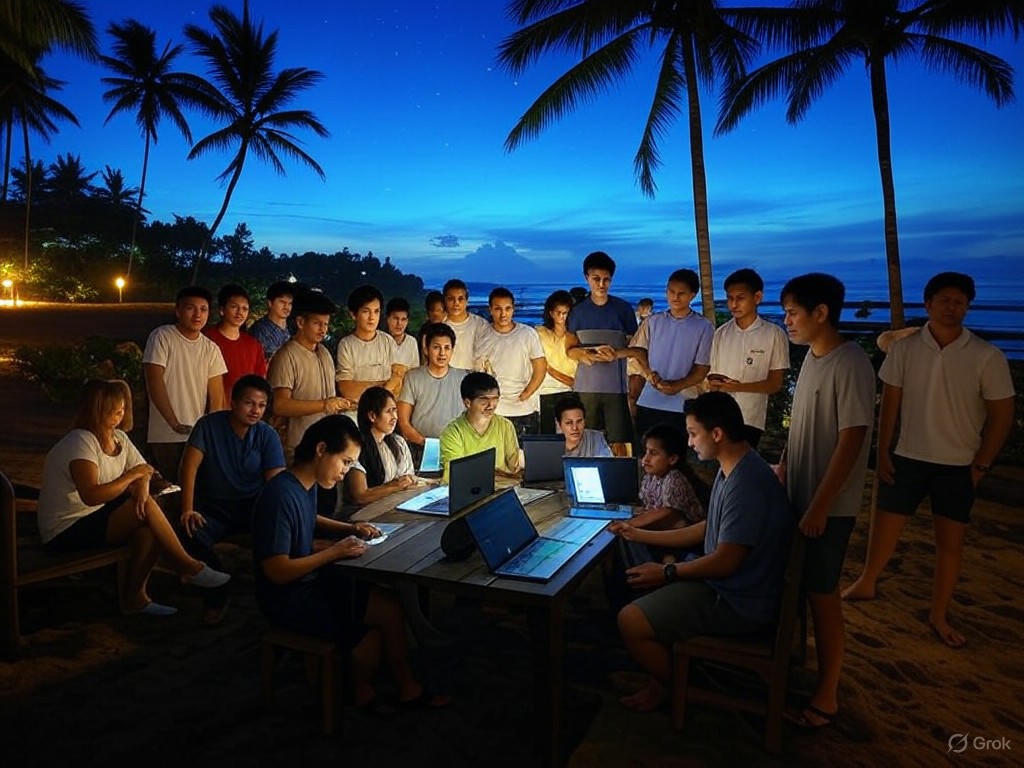Remote Work in Bali: Digital Nomad Hubs
In the shadow of Bali's ancient rice terraces and sun-drenched beaches, a new breed of worker has emerged, blending the island's timeless allure with the relentless pace of modern technology. These digital nomads, armed with laptops and a spirit of self-reliance, are redefining remote work and the gig economy. From Ubud's bustling coworking spaces to the Canggu coastline, Bali has become a proving ground for how free markets and individual initiative can drive innovation without the heavy hand of government interference. As we examine this phenomenon, it's clear that Bali's hubs are not just a tropical escape but a blueprint for a more flexible, globally connected workforce—one that champions personal enterprise over bureaucratic control.
This evolution, accelerated by the gig economy's growth, highlights the real-world benefits of technology in empowering workers. Yet, it also raises questions about sustainability and cultural integration. Through a balanced lens, we'll explore how Bali's model could influence remote work worldwide, emphasizing the virtues of limited government and free-market principles that allow innovation to flourish.

Digital nomads gather at a Canggu beachside hub, where the blend of work and leisure exemplifies the gig economy's appeal.
The Allure of Bali: A Gateway to Remote Work
Bali's rise as a digital nomad hub is no accident; it's the product of entrepreneurial drive and adaptive local economies. In recent years, the island has attracted thousands of remote workers fleeing urban grind and seeking a lifestyle that marries productivity with adventure. According to estimates from various industry reports, Bali hosts over 50,000 digital nomads annually, drawn by affordable living costs, high-speed internet, and a welcoming community Nomad List Report. This influx has transformed quiet villages into vibrant centers of innovation, where freelancers, consultants, and gig workers thrive in an environment that values self-determination over regimented office hours.
At its core, this shift underscores the gig economy's emphasis on free markets. Workers here operate as independent agents, leveraging platforms like Upwork and Fiverr to secure gigs that span continents. Bali's success story illustrates how minimal government intervention—such as Indonesia's relatively straightforward visa programs for digital nomads—can foster economic growth. Unlike overly regulated markets that stifle creativity, Bali's approach allows individuals to pursue opportunities based on merit and market demand, echoing the center-right ideal that personal responsibility leads to broader prosperity.
Technology plays a pivotal role in this transformation. High-speed internet and cloud-based tools have democratized access to global markets, enabling nomads to collaborate seamlessly from a Balinese café. This isn't just about convenience; it's about resilience. The COVID-19 pandemic, for instance, forced many to adapt, and Bali's hubs proved adaptable, with local entrepreneurs quickly establishing pop-up workspaces Wall Street Journal on Remote Work Trends. Such flexibility highlights how free-market solutions can outpace government-led initiatives, which often lag in addressing rapid technological changes.
Analyzing the Impact: Technology and the Gig Economy in Action
To understand Bali's influence on global remote work, we must dissect the interplay between technology, the gig economy, and traditional values. Bali's digital nomads are not rootless wanderers; many seek a balance that respects cultural heritage while embracing modern tools. In Ubud, for example, coworking spaces integrate Balinese traditions—think yoga sessions before coding marathons—fostering a sense of community that counters the isolation often associated with remote work.
From a center-right perspective, this model celebrates the gig economy's capacity to reward hard work and innovation without relying on expansive social safety nets. Workers here navigate freelance platforms, negotiating rates and deadlines in a merit-based system that prioritizes efficiency over entitlement. Technology amplifies this: advancements in AI and collaborative software, such as Slack and Zoom, have made it possible for nomads to manage projects across time zones, boosting productivity and global connectivity IEEE Spectrum on Remote Tech Innovations. Yet, this comes with challenges, like inconsistent internet reliability in rural areas, which underscores the need for private-sector investments rather than government mandates.
Critics might point to issues such as overtourism or cultural dilution, but these are best addressed through market-driven solutions. Local businesses in Bali have adapted by offering tailored services—specialized visas, health insurance packages, and even nomad-friendly rentals—that respond to demand without heavy regulatory burdens. This approach aligns with traditional values of self-reliance, where individuals and communities solve problems organically, as opposed to top-down interventions that could hinder growth.

A remote worker sets up shop amid Bali's iconic rice terraces, symbolizing the fusion of ancient landscapes and modern gig economy demands.
Evidence and Global Implications: A Balanced View
The evidence supporting Bali's role in shaping remote work is compelling and multifaceted. Data from the World Bank indicates that countries embracing digital nomad policies, like Indonesia, have seen a 20% increase in freelance earnings since 2020, driven by the gig economy's expansion World Bank Digital Economy Report. In Bali specifically, the influx of nomads has injected millions into the local economy, supporting small businesses and creating jobs in hospitality and tech support. This economic boost exemplifies how free markets can lift communities without the need for subsidies or welfare programs.
However, balance requires acknowledging potential downsides. Not all nomads integrate seamlessly; reports of rising real estate costs and environmental strain in popular areas like Seminyak highlight the need for sustainable practices Forbes on Gig Economy Sustainability. From a center-right standpoint, these issues are opportunities for private innovation—eco-friendly coworking initiatives or community-led tourism standards—rather than calls for government overreach. Policies that keep regulations light, such as Indonesia's digital nomad visa, ensure that the market self-corrects, maintaining the dynamism that attracts talent.
Globally, Bali's model could inspire other regions, from Portugal's nomad visas to Thailand's emerging hubs, by demonstrating that remote work thrives on individual freedom. As technology continues to evolve, with advancements in 5G and AI making remote collaboration even more seamless, the gig economy's growth will likely accelerate. Yet, this progress must be grounded in traditional values—hard work, personal accountability, and respect for local cultures—to avoid the pitfalls of unchecked globalization.
Conclusion: A Path Forward for the Global Workforce
In the end, Bali's digital nomad hubs offer a compelling vision for the future of remote work and the gig economy—one built on the foundations of free markets, technological innovation, and individual initiative. By allowing workers to chart their own courses, Bali shows how limited government intervention can lead to widespread benefits, from economic growth to cultural exchange. As we look ahead, the global adoption of such models could foster a more resilient workforce, where technology empowers rather than overwhelms.
Yet, success depends on maintaining balance. Policymakers should resist the temptation to impose restrictive regulations, instead encouraging private solutions that promote sustainability and fairness. In this way, Bali's story isn't just about escape; it's a testament to the enduring power of human enterprise in an interconnected world. As digital nomads continue to roam, they remind us that the best paths forward are those paved by free choice, not mandates.

A nighttime tech gathering in Ubud, where nomads discuss the future of remote work, blending innovation with island serenity.

